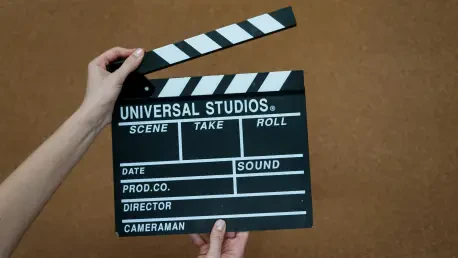Imagine a world where a blockbuster film’s lead actor isn’t a human but a fully digital creation, crafted by algorithms and brought to life without a single day on set, presenting a startling shift in how movies are made. This isn’t science fiction—it’s the reality Hollywood faces as artificial intelligence (AI) reshapes the industry. The rapid integration of AI technologies has sparked a fierce debate among filmmakers, actors, and writers, dividing the creative community into passionate advocates and staunch critics. On one side, there are those who see AI as a groundbreaking tool to push the boundaries of storytelling and efficiency. On the other, many fear it threatens the very essence of human creativity and the authenticity that has defined cinema for over a century. This clash of perspectives represents more than just a technological shift; it’s a profound cultural and ideological battle over the future of an art form. As AI continues to infiltrate various aspects of production, the industry stands at a pivotal moment, forced to grapple with questions of innovation versus tradition.
AI as a Creative Revolution
The potential of AI to revolutionize filmmaking cannot be understated, as it introduces tools that streamline processes and open new creative avenues. Technologies like AI-generated performers, exemplified by digital creations such as Tilly Norwood, demonstrate how entire characters can be crafted without human actors, cutting costs and expanding imaginative possibilities. Platforms like Showrunner further illustrate this trend by automating content creation and distribution, enabling producers to generate scripts or even full episodes with minimal human input. Advocates argue that such innovations allow for experimentation that was previously unthinkable, offering smaller studios and independent creators access to high-end production capabilities. However, this enthusiasm is tempered by concerns over quality and depth, as some question whether machine-driven narratives can truly capture the nuanced emotions and cultural contexts that human storytellers bring. The promise of efficiency and novelty drives this side of the debate, positioning AI as an inevitable evolution in an industry historically shaped by technological progress.
The Human Heart of Cinema
In stark contrast to the optimism surrounding AI, a significant portion of Hollywood remains deeply skeptical, viewing these advancements as a direct threat to the soul of filmmaking. Critics argue that the essence of cinema lies in human collaboration, emotion, and lived experience—elements they believe AI cannot replicate authentically. The fear of job displacement looms large, with actors, writers, and other creatives worrying that automation could render their roles obsolete, prioritizing cost-saving over artistic integrity. Even as some traditional storytellers experiment with digital tools, there’s a pervasive concern that over-reliance on AI risks diluting the cultural significance of film as a medium of human expression. This resistance isn’t merely about preserving the status quo; it reflects a broader anxiety about losing the unique, imperfect beauty of human-driven narratives. As this divide persists, with neither side showing willingness to budge, the industry faces a complex challenge in balancing innovation with the values that have long defined it, setting the stage for years of unresolved tension.









